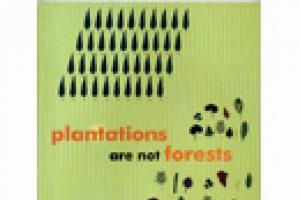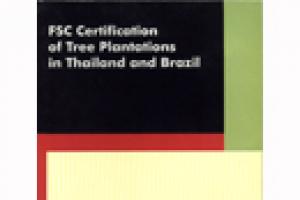The World Bank Prototype Carbon Fund’s (PCF) Plantar project has been heavily criticized by NGOs and civil society movements ever since it first emerged as the first industrial eucalyptus tree plantation to claim carbon sink credits from the Kyoto Protocol’s Clean Development Mechanism. The Plantar project involves 23,100 hectares of monoculture eucalyptus plantations for the production of charcoal, which will be used in pig iron production.
Large-Scale Tree Plantations
Industrial tree plantations are large-scale, intensively managed, even-aged monocultures, involving vast areas of fertile land under the control of plantation companies. Management of plantations involves the use of huge amounts of water as well as agrochemicals—which harm humans, and plants and animals in the plantations and surrounding areas.
Bulletin articles
14 November 2003
Bulletin articles
14 November 2003
The Clean Development Mechanism (CDM) of the Kyoto Protocol under the United Nations Framework Convention on Climate Change may be totally useless to address climate change, but it may prove to be good business for some parties. The assumption is that in return for investment in a project that cuts or reduces emissions in a southern country, companies will earn certified emission reductions (CERs) that industrialized countries may use to meet Kyoto Protocol commitments.
Bulletin articles
14 November 2003
The Asian Development Bank (ADB) has big plans for plantations in Laos. World Rainforest Movement has obtained a leaked report of a recent ADB mission to Laos which describes how the Bank hopes to attract international pulp and paper companies to invest in Laos.
Over the past ten years, the ADB has funded an area of approximately 12,000 hectares in Laos through its $11.2 million “Industrial Tree Plantations Project”. Under its planned “Forest Plantations for Livelihood Sector Project” the Bank intends to finance 30,000 hectares of plantations.
Other information
22 October 2003
By Chris Lang, published in "Pulping the Mekong"
In December 1993, the Asian Development Bank agreed a US$11.2 million loan for an "Industrial Tree Plantations Project" in Laos. Phase 1 of the project, which ran until 2003, aimed to plant 9,600 hectares with fast-growing tree plantations. Phase 2 of the project, "Tree Plantations for Livelihood Improvement" is currently under preparation and will go to the ADB's Board for a decision on funding in October 2003. Under phase 2 the ADB plans to plant a further 10,000 hectares.
The project raises several important concerns:
Bulletin articles
17 October 2003
Timberwatch, a coalition of environmental NGOs and individuals, has renewed an appeal made during the World Summit on Sustainable Development in 2002, calling on the South African government, as well as on the timber industry, to halt the planting of new industrial timber plantations in naturally vegetated areas, especially grasslands.
Bulletin articles
17 October 2003
Plantation of exotics --rubber, acacia and eucalyptus in particular-- is one major factor that has changed the Modhupur sal forest (Shorea robusta) for ever, with severe consequences for the ethnic communities --Garos and Koch-- who have lived in the forest for centuries.
With loan money from the Asian Development Bank and the World Bank in particular, the government has actually established plantations of alien species all over the public forestland. Except for the Sundarban, only fragments of native forests remain in Bangladesh.
Bulletin articles
17 October 2003
The Kali Bachao Andolan (Movement to Save the Kali) made a dramatic move against the serious pollution that the West Coast Paper Mills (WCPM) is causing to the Kali River by discharging untreated effluents. For long local people have suffered enormously from the pollution as they were repeatedly threatened with job losses if WCPM was pressurized to be environmentally responsible.
Bulletin articles
17 October 2003
During the second half of September this year, the Ecuadorian NGO Acción Ecológica organized a national meeting in Quito on the subject of “Plantations are not forests.” On 20 and 21 September, approximately 40 organizations representing Ecuadorian Indigenous movements, peasants, people of Afro-Ecuadorian descent, NGOs and parliamentarians, together with representatives from Brazil, Chile and Uruguay analysed the issue of plantations and exchanged experiences.
Bulletin articles
17 October 2003
Like so many other countries in the South, Uruguay has been convinced (by FAO, the World Bank and the Japanese International Cooperation Agency, among others) that it should promote large-scale tree plantations. From the start, it was very clear that the objective was to produce sufficient raw material for pulp production and for this reason, fundamentally, the plantation of eucalyptus was promoted.
Bulletin articles
17 October 2003
My family's individual struggle and victimisation is typical of what is happening across the populated and high-rainfall areas of rural Australia. In 1984 we moved to North West Tasmania and chose a relatively isolated area to live --one that was away from farms that used chemicals and where the stands of native bush were extensive and beautiful.
Publications
9 October 2003
This book gathers a selection of articles published in the monthly electronic bulletin of the World Rainforest Movement (WRM), addressing the issues of plantations and the struggles developed at the local and global levels against them.
Publications
8 August 2003
By the World Rainforest Movement
Concern over the spread of tree monocultures and their certification is at the centre of this book. However, this concern is merely one part of much broader concerns concerning forests, forest peoples’ livelihoods and communities of living things.



